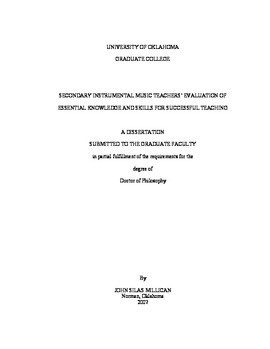| dc.contributor.advisor | Raiber, Michael A., | en_US |
| dc.contributor.advisor | Barry, Nancy H., | en_US |
| dc.contributor.author | Millican, John Silas. | en_US |
| dc.date.accessioned | 2013-08-16T12:20:52Z | |
| dc.date.available | 2013-08-16T12:20:52Z | |
| dc.date.issued | 2007 | en_US |
| dc.identifier.uri | https://hdl.handle.net/11244/1244 | |
| dc.description.abstract | A pilot study of instrumental music teachers in Texas (N = 60) was completed, and revisions to the questionnaire and variables used in the main study were made. The final portion of the study asked band and orchestra teachers in secondary schools from across the United States ( N = 214) to complete an anonymous, online survey ranking the relative importance of various knowledge and skills. | en_US |
| dc.description.abstract | This list of knowledge and skills was organized within a framework modeled after Schulman (1986, 1987) which reflects the complex nature of how the skills and knowledge are combined in the classroom. This philosophical framework organizes the areas of Content Knowledge, General Pedagogical Knowledge, Curriculum Knowledge, Knowledge of Learners and Their Characteristics, Pedagogical Content Knowledge, Knowledge of Educational Contexts, and Administrative Knowledge. | en_US |
| dc.description.abstract | Results of this study may help guide curriculum development of undergraduate and graduate music-education programs as well as help inform continuing education for teaching professionals. | en_US |
| dc.description.abstract | Respondents ranked Pedagogical Content Knowledge, Content Knowledge, and General Pedagogical Knowledge as the top three categories that contributed to their success. There were no significant differences in the rankings of any of the categories among various sub-groups. Significant interaction was observed between individual importance ratings of specific skills within the major categories. The most notable interaction was between the rankings of specific items in the Content Knowledge, Curriculum Knowledge, and General Pedagogical Knowledge areas with the variables of class assignment, experience level, and region of the United States. | en_US |
| dc.description.abstract | This study investigates perceptions of secondary instrumental music teachers regarding the importance of knowledge and skills identified in research literature as being essential to professional success. A representative knowledge base was compiled by reviewing accreditation and certification organizations' guidelines, research studies, and music education textbooks. This list was reviewed by instrumental music education faculty (N = 20) from across the United States in order to establish content and construct validity of the knowledge and skill items. | en_US |
| dc.format.extent | xv, 230 leaves : | en_US |
| dc.subject | School music Instruction and study. | en_US |
| dc.subject | Education, Secondary. | en_US |
| dc.subject | Education, Music. | en_US |
| dc.subject | Music teachers Training of United States. | en_US |
| dc.subject | Education, Teacher Training. | en_US |
| dc.subject | Instrumental music Instruction and study. | en_US |
| dc.title | Secondary instrumental music teachers' evaluation of essential knowledge and skills for successful teaching. | en_US |
| dc.type | Thesis | en_US |
| dc.thesis.degree | Ph.D. | en_US |
| dc.thesis.degreeDiscipline | School of Music | en_US |
| dc.note | Source: Dissertation Abstracts International, Volume: 68-06, Section: A, page: 2375. | en_US |
| dc.note | Advisers: Nancy H. Barry; Michael A. Raiber. | en_US |
| ou.identifier | (UMI)AAI3271246 | en_US |
| ou.group | Weitzenhoffer Family College of Fine Arts::School of Music | |
